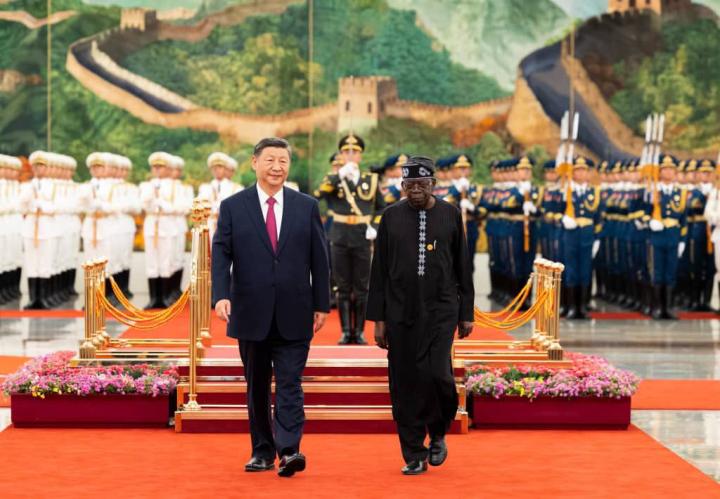Nigeria’s growing dependence on imports from China has continued to raise significant concerns among economic experts, trade analysts, and industrial stakeholders who warn that the trend could have long-term negative consequences on the country’s economic sovereignty, industrial development, and balance of trade.
Over the past decade, China has solidified its position as Nigeria’s largest source of imports, accounting for a substantial portion of machinery, electronics, household items, textile materials, and industrial components that enter the country. Despite various economic reform initiatives aimed at improving local production, Nigeria still heavily relies on external sources, with Chinese imports making up a dominant share of the country’s total trade inflows.

Economic observers argue that this pattern of dependence does not support sustainable development. With an overwhelming percentage of imports coming from China, the country risks exposing its local industries to unfair competition, stifling innovation and discouraging investment in domestic manufacturing. Analysts have repeatedly noted that cheaper Chinese products, while affordable for consumers, often displace locally made goods that cannot compete in price or volume, resulting in closures of factories and loss of jobs.
Dr. Johnson Oladele, an economic policy analyst, explained that the imbalance in Nigeria’s trade relationship with China has become structural. According to him, “We are importing far more than we export, especially when it comes to our relationship with China. That’s a dangerous model because we are not building resilience, we are outsourcing our productivity.”
While trade data indicates that Chinese goods flood Nigerian markets across various sectors, including construction, agriculture, telecommunications, and manufacturing, Nigeria’s exports to China remain minimal, largely limited to crude oil and a few raw materials. This lopsided arrangement results in a significant trade deficit, as the value of imports continues to outpace exports.
The implications of this are far-reaching. A persistent trade deficit exerts pressure on Nigeria’s foreign exchange reserves, contributes to currency depreciation, and can widen inflationary trends. Furthermore, the reliance on imported goods weakens the motivation to develop domestic industries, leaving the country vulnerable in times of global supply chain disruptions, such as those witnessed during the COVID-19 pandemic.
Another dimension of the issue involves the financial and infrastructural ties Nigeria maintains with China. Over the years, Nigeria has entered into several loan agreements with Chinese financial institutions to fund major infrastructure projects, including railways, power plants, and road networks. While these developments are seen as necessary for national growth, experts have raised concerns about the terms and conditions attached to the loans, particularly clauses that may allow foreign control over strategic national assets in cases of repayment failure.
Critics argue that while China’s engagement with Nigeria has led to the completion of key infrastructural projects, these engagements often do not include technology transfer or capacity development for local workers. Many projects are executed using Chinese labor and machinery, with minimal involvement of Nigerian engineers or professionals. This model, they say, limits the long-term benefits of such projects on the local economy and undermines knowledge acquisition that could stimulate indigenous innovation.
Trade and investment experts have called on the government to recalibrate its approach to international trade and adopt a more strategic model that prioritizes diversification and local content development. They recommend that Nigeria must build stronger trade relationships with a broader range of countries, including those in Africa, South Asia, and Latin America, to reduce overreliance on any single country.
To address this challenge, several solutions have been proposed. First, there is a need to aggressively promote local manufacturing through tax incentives, access to finance, and infrastructure support. Encouraging the production of goods currently imported from China within Nigeria would help retain capital within the economy and create job opportunities.
Second, Nigeria should invest in improving the quality and standards of its products to make them competitive in the international market. Trade policies must also be reviewed to create a level playing field for local producers who are currently disadvantaged by the influx of low-cost imports.
Third, experts advise that Nigeria should enter future foreign loan agreements with greater transparency and prioritize clauses that allow for mutual benefits, including job creation and skills development. Local participation should be a prerequisite for all major infrastructural investments to ensure that Nigerians derive direct and indirect benefits from such partnerships.
Finally, the government is encouraged to strengthen the implementation of policies such as the Executive Order on local content, which mandates the patronage of Nigerian-made goods and services in public procurement. This, if effectively implemented, could gradually reduce the country’s appetite for imports and improve domestic production capacity.
As Nigeria continues to grapple with economic diversification and industrial development challenges, the warnings from experts underscore the importance of building a resilient economy that does not overly rely on external sources. Reducing the dependence on Chinese imports is viewed not as an anti-China stance but as a strategic necessity for national economic stability and sustainable development.
Support InfoStride News' Credible Journalism: Only credible journalism can guarantee a fair, accountable and transparent society, including democracy and government. It involves a lot of efforts and money. We need your support. Click here to Donate
